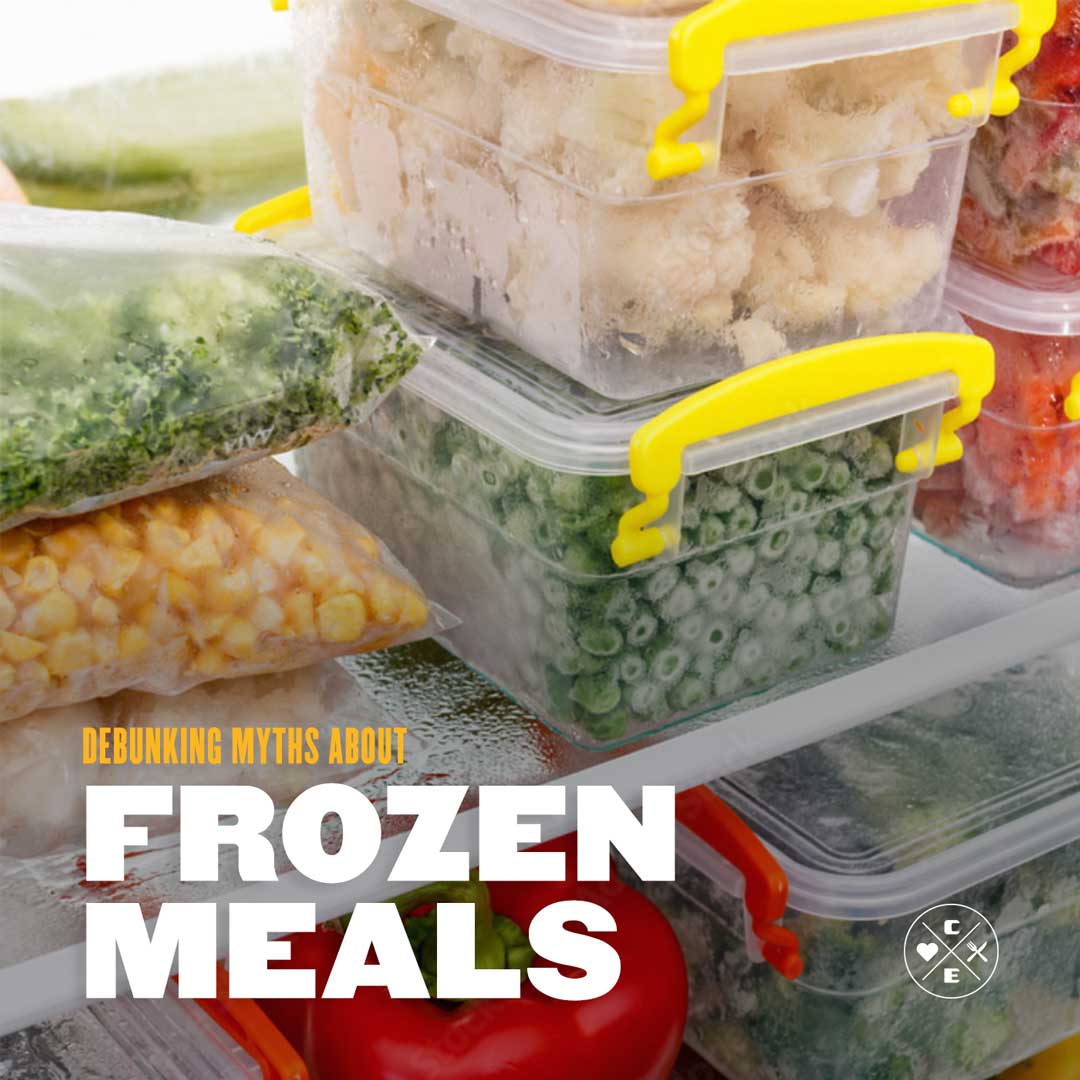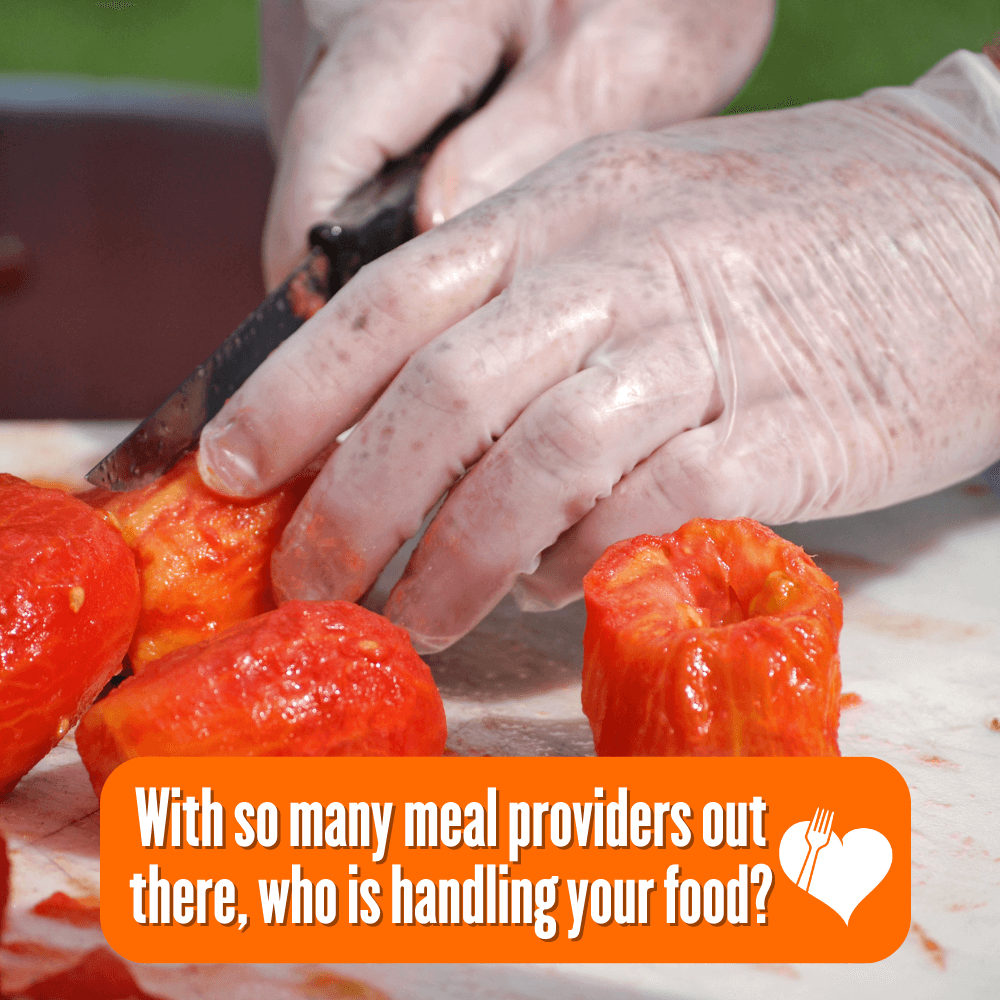
Debunking Myths About Frozen Prepared Meals
Dorothy M. Shirnyl, RND
Nutrition
|
Healthy Recipes
|
Healthy Lifestyle
11 minute read
Did you know that the global frozen food market is projected to reach a staggering $380.5 billion by 2027? This meteoric rise speaks volumes about the increasing popularity of frozen prepared meals, driven by their convenience and perceived time-saving benefits.
However, despite their growing presence in our kitchens, frozen meals are often shrouded in myths and misconceptions. This blog aims to dispel these common misconceptions, shedding light on the truth about frozen prepared meals in terms of their nutritional value, convenience, and cost-effectiveness.
By knowing the facts, you can make informed choices about incorporating frozen meals into your diet, reaping their benefits without succumbing to unfounded fears. Here, we will uncover the following myths:
- Myth #1: Frozen Meals Are Unhealthy
- Myth #2: Frozen Meals Are Loaded with Preservatives
- Myth #3: Frozen Meals Lack Flavor and Variety
- Myth #4: Frozen Meals Are Only for the Lazy or Unhealthy
- Myth #5: Frozen Meals Are Expensive
- Myth #6: Frozen Meals Are Not Environmentally Friendly
Myth #1: Frozen Meals Are Unhealthy
Frozen meals often get a bad rap, with concerns about excessive sodium, artificial preservatives, and a lack of essential nutrients. However, these concerns are often based on outdated information and misconceptions.
Fact: Freezing Preserves Nutrients
Freezing acts as a natural "pause button" for food, halting the enzymatic and oxidative processes that lead to nutrient degradation.
Fruits and vegetables are often picked at their peak ripeness, when their nutrient content is highest, and then flash-frozen within hours of harvest. This rapid freezing process locks in vitamins, minerals, and antioxidants, preserving their nutritional value for extended periods. In fact, studies have shown that frozen produce can sometimes retain even more nutrients than fresh produce that has been stored for days or weeks, as the latter gradually loses its nutritional value over time.
Fact: The Frozen Food Industry is Embracing Quality Ingredients
The frozen food industry has come a long way from the days of heavily processed, sodium-laden meals. Today, there's a growing emphasis on using fresh, whole ingredients and minimizing artificial additives. Many brands now offer frozen meals featuring:
- Whole grains. Providing fiber, B vitamins, and other essential nutrients
- Lean proteins. Such as chicken, fish, or tofu, contributing to muscle building and repair
- Colorful vegetables. Packed with vitamins, minerals, and antioxidants
- Healthy fats. Like those found in avocado or olive oil, supporting heart health and brain function
By carefully reading nutrition labels and ingredient lists, you can easily find frozen meals that align with your dietary needs and preferences, ensuring you're getting a wholesome and nourishing meal.
Fact: Frozen Meals Aid in Portion Control
One of the challenges of maintaining a healthy diet is managing portion sizes. Frozen meals come in pre-portioned servings, taking the guesswork out of meal planning and helping you avoid overeating.
This can be particularly beneficial for those watching their calorie intake or trying to maintain a healthy weight. Additionally, portion-controlled frozen meals can help reduce food waste by providing just the right amount of food for one person.
Myth #2: Frozen Meals Are Loaded with Preservatives
The fear of artificial preservatives often casts a shadow over the frozen food aisle, with many believing these meals are loaded with them to maintain their extended shelf life. This concern stems from the potential health risks associated with some preservatives, like increased risk of certain diseases or allergic reactions. However, the reality is quite different.
Fact: Freezing is a Natural Preservative
The process of freezing itself is a highly effective method of preservation. By significantly slowing down chemical reactions, freezing halts the breakdown of nutrients and prevents the growth of microorganisms that cause spoilage and foodborne illness. This natural "pause button" allows frozen foods to maintain their quality and safety for extended periods without the need for additional preservatives.
Fact: Advancements in Food Technology Reduce the Need for Preservatives
Beyond the natural preservation power of freezing, technological innovations in the food industry have significantly decreased the reliance on artificial preservatives in frozen meals. Some of these advancements include:
- Blast Freezing. Modern freezing technologies, like blast freezing, rapidly freeze food at extremely low temperatures. This rapid freezing minimizes the formation of large ice crystals, which can damage food texture and quality. By preserving the structural integrity of the food, the need for artificial additives to maintain texture is reduced.
- Modified Atmosphere Packaging (MAP). This technique involves altering the atmosphere within the food packaging to inhibit the growth of spoilage microorganisms. By reducing oxygen levels and increasing carbon dioxide or nitrogen, MAP extends the shelf life of frozen foods without relying heavily on preservatives.
Fact: Improved Ingredient Sourcing and Handling
The frozen food industry has made strides in sourcing high-quality ingredients and implementing strict hygiene practices during processing. This helps minimize the initial microbial load on the food, further reducing the need for preservatives.
Fact: Label Transparency Empowers Consumers
While some frozen meals may still contain preservatives, the trend is shifting towards cleaner labels. Many brands are opting for minimal or no artificial additives in response to consumer demand. Reading the ingredient list empowers you to choose meals aligned with your preferences.
Myth #3: Frozen Meals Lack Flavor and Variety
The myth that frozen meals lack flavor and variety is rooted in a perception of bland, processed food with limited options. This outdated view overlooks the culinary evolution of the frozen food aisle, which now boasts diverse cuisines, innovative flavors, and high-quality ingredients that challenge the notion of frozen meals as uninspired and monotonous.
Fact: The Freezer Aisle is a Flavor Fiesta
Gone are the days when the frozen food aisle was a wasteland of bland and uninspiring options. Today, it's a vibrant culinary landscape brimming with a diverse array of flavors and cuisines. From classic comfort foods to exotic international dishes, the freezer section is your gateway to a world of taste adventures, all conveniently accessible within your own kitchen.
Whether you're craving authentic Italian pasta, spicy Thai curries, or hearty Mexican enchiladas, you're sure to find a frozen meal that satisfies your taste buds.
Fact: Brands are Stepping Up Their Game
The days of mushy, unappetizing frozen meals are fading fast. Brands are investing in research and development to revolutionize the frozen food experience. By using premium ingredients, innovative cooking techniques, and carefully crafted flavor combinations, they're creating meals that rival the quality and taste of restaurant dishes. From perfectly cooked proteins to vibrant vegetables and flavorful sauces, frozen meals are now a far cry from their bland predecessors.
Fact: The Reviews Are In!
Don't just take our word for it. Countless online reviews and social media posts attest to the deliciousness of today's frozen meals.
Food bloggers, health enthusiasts, and everyday consumers are sharing their positive experiences, showcasing the incredible variety and quality of frozen food options. These glowing testimonials prove that frozen meals can be a delightful and satisfying part of any meal plan.
Myth #4: Frozen Meals Are Only for the Lazy or Unhealthy
Frozen meals are often unfairly dismissed as the go-to option for those who lack culinary skills or disregard their health. This outdated stereotype paints a picture of frozen meals as a last resort for the time-crunched or nutritionally indifferent.
Fact: It’s a Lifeline for Busy Lifestyles
Time is a precious commodity. Frozen meals provide a practical solution for individuals juggling demanding schedules, offering a quick and accessible way to nourish their bodies without sacrificing valuable hours in the kitchen. If you're a busy professional, a parent juggling work and family life, or a student with a packed schedule, frozen meals can be a lifesaver.
Fact: Frozen Meals Can Cater to Health-Conscious Choices
The frozen food industry has undergone a remarkable transformation, recognizing the growing demand for healthier options. Numerous brands now cater specifically to health-conscious individuals, offering a diverse range of meals tailored to various dietary needs and preferences. From keto and vegetarian options to gluten-free and low-sodium choices, the freezer aisle has something for everyone seeking a nutritious and convenient meal.
Fact: Frozen Meals Simplify Meal Planning and Portion Control
Frozen meals can be a valuable tool for meal planning and portion control. They eliminate the guesswork from portion sizes and provide a balanced meal with minimal effort. This can help you stay on track with your dietary goals and avoid overeating.
Myth #5: Frozen Meals Are Expensive
Many people believe that frozen prepared meals are inherently more expensive than cooking from scratch, leading to a strain on their budget. However, this perception often overlooks the hidden costs of cooking at home
Fact: Frozen Meals Can Be Surprisingly Affordable
While it's true that some gourmet frozen meals can be pricey, it's crucial to consider the hidden costs of cooking from scratch. Factor in the expenses of purchasing individual ingredients, the time spent shopping and preparing the meal, and the potential for unused ingredients to end up in the trash. When you account for these factors, frozen meals often prove to be a cost-effective alternative.
Fact: Frozen Meals Can Reduce Food Waste
Food waste is a significant contributor to household expenses. We've all been there – buying fresh ingredients with the best of intentions, only to have them spoil before we find the time to cook them. Frozen meals eliminate this problem and it allows you to use every portion and minimize waste.
Fact: Budget-Friendly Options Are Plentiful
The frozen food aisle isn't just for premium brands. You'll find a wide array of affordable frozen meals that offer both taste and nutrition without putting a strain on your wallet. Look out for sales and discounts, which can make frozen meals even more budget-friendly.
Myth #6: Frozen Meals Are Not Environmentally Friendly
A prevailing concern is that the convenience of frozen meals comes at a cost to the environment. The perception is that the excessive packaging and energy consumption associated with freezing and storage contribute to ecological damage.
Fact: Sustainable Packaging is on the Rise
The frozen food industry is actively responding to environmental concerns by embracing eco-conscious practices. Many brands are transitioning to sustainable packaging solutions, utilizing recyclable or compostable materials. This shift significantly reduces the environmental impact of frozen meals, making them a more eco-friendly choice.
Fact: Freezing Can Be More Energy-Efficient
While freezing undeniably requires energy, it's essential to consider the broader picture. When compared to other preservation methods, freezing can often prove to be more energy-efficient in the long run.
Think about the vast amounts of energy expended to transport fresh produce across long distances or the energy wasted when food spoils before it reaches our tables. Freezing helps mitigate these energy losses, contributing to a more sustainable food system.
Fact: Reduced Food Waste is a Win for the Planet
Food waste is a significant environmental issue, leading to greenhouse gas emissions and the depletion of valuable resources. Frozen meals play a crucial role in reducing food waste due to their extended shelf life. This allows for mindful consumption, minimizing the amount of food that ends up in landfills.
In essence, the environmental impact of frozen meals is not as straightforward as it may seem. With a growing focus on sustainable packaging and the potential for reducing food waste, frozen meals can be a part of a responsible and eco-conscious approach to food consumption.
Don't Judge a Meal by Its Freezer Box
In this blog, we've shattered six common myths about frozen prepared meals, revealing that they are not the nutritional villains they're often made out to be. From preserving nutrients to offering diverse flavors and catering to various dietary needs, frozen meals have evolved into a convenient and healthy option for modern lifestyles.
So, we encourage you to embrace the freezer aisle with an open mind. Explore the variety of frozen meals available, read the labels, and discover the delicious and nutritious options that await. Whether you're a busy professional, a parent on the go, or simply looking for a quick and easy meal solution, frozen meals can be a valuable addition to your culinary repertoire.
Remember, a well-stocked freezer isn't just about convenience – it's about embracing a healthier, more sustainable way of eating. So, let's defrost those misconceptions and give frozen meals the recognition they deserve!
Start your week with a healthy meal plan!



